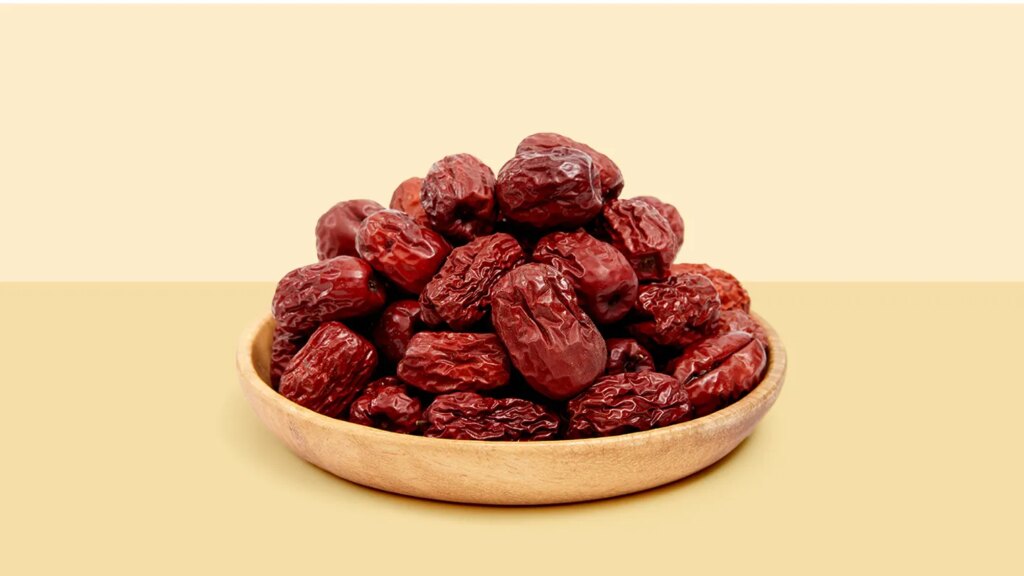Jujube fruit is a nutritious option with plenty of vitamins and minerals. And no, we’re not talking about the candy, but the real fruit.
Like most other fruits, jujubes contain a significant amount of carbohydrates, which means they may cause your blood sugar level to rise if you have diabetes. But in moderation, jujubes can have a place in a healthy, diabetes-friendly diet.
This date-like fruit is popular in parts of Asia. It may not be easy to find in grocery stores in the United States but may be available from specialty grocers. It can be enjoyed fresh or dried, though dried fruits tend to be easier to overeat, according to the American Diabetes Association.
Jujube Nutrition Facts
Fresh jujubes look and taste a little bit like small apples. They can come in many shades of green and red.
A 100-gram (g) serving of jujube fruit (3.5 ounces, or about a handful) has 79 calories and 20 g of carbohydrates, according to the U.S. Department of Agriculture (USDA).
That serving is also packed with almost all of the recommended daily amount of vitamin C, which helps the body’s immune system and provides antioxidants, according to the Office of Dietary Supplements.
B vitamins and minerals such as iron and phosphorus are also found in jujube fruit, says Shanthi Appelö, RD, a registered dietitian and health and wellness spokesperson with Blue Cross Blue Shield of Michigan in Detroit.
Dried jujubes, which resemble dates, are far more dense, according to the USDA. A 100-g serving has 281 calories and 73 g of carbohydrates, including 6 g of fiber. It has even more vitamins and minerals, but the lower water content can make it easier to overeat.
If you’re buying dried jujube fruit, make sure the product does not have added sugar and is not canned in syrup. Jujubes are often candied and sweetened, and adding refined sugars only makes them less healthy.
Is Jujube Fruit Good for Diabetes?
Fresh jujube fruit contains a fair amount of carbohydrates, like other fresh fruits, which means it has the potential to spike your blood sugar.
But even high-carb fruit can be a healthy part of a diabetes diet when enjoyed in moderation, according to Cleveland Clinic.
Appelö says that, because of its high fiber content, jujube is a good fruit choice when you have diabetes: “Relative to other fruit, jujube fruit is high in fiber.”
Fiber takes longer to digest, so it has less of an immediate effect on your blood sugar. It’s also more filling than other carbs and supports healthy digestion, according to the Centers for Disease Control and Prevention (CDC).
If you’re looking for jujube fruit in the United States, it might be easier to find dried fruit rather than fresh. But beware: Dried jujube fruit tends to be higher in sugar. That means you need to stay mindful of your serving size.
Appelö says it takes only about 2 tablespoons of dried jujubes to eat one serving of 15 g of carbohydrates.
How to Enjoy Jujube Fruit
Because it’s easy to overdo it on fruit, Appelö says it makes sense to combine jujubes with protein and fat to help manage your blood sugar.
Adding some protein to your fruit also keeps you feeling fuller longer, according to the National Library of Medicine.
Jujube fruit can be part of smart carb-protein snacking with nuts or low-fat dairy. If you have diabetes and want to enjoy some jujube, Appelö suggests the following:
- Mix a tablespoon or two of dried jujube fruit into a trail mix.
- Place dried jujube fruit on top of toasted oats.
- For fresh jujubes, slice them on top of a salad, oatmeal, or yogurt.

